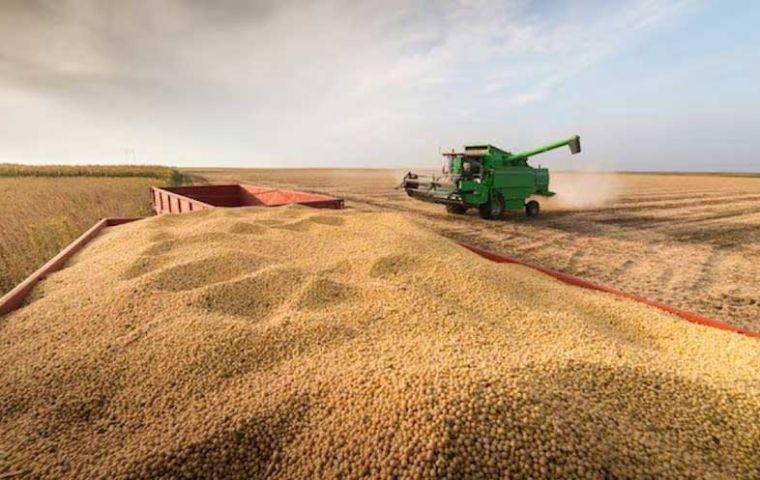MercoPress. South Atlantic News Agency
Paraguay consolidating as the world's third exporter of soybeans
 Paraguay surpassed its drought-hit neighbor Argentina, while, last year, it ranked third among global exporters
Paraguay surpassed its drought-hit neighbor Argentina, while, last year, it ranked third among global exporters  Low river levels had slowed down shipments, which were crucial for barges that transport the grain downstream the Paraguay and Parana rivers.
Low river levels had slowed down shipments, which were crucial for barges that transport the grain downstream the Paraguay and Parana rivers. Paraguayan exports of soybeans are gaining steam, according to shipment data provided by Marine Link. Farmers are accelerating sales due to a stronger global market and higher prices for the oil seed.
Accordingly the landlocked Mercosur member’s oil seed shipments in May reached 1.13 million metric tons, an increase of around 34% over the previous month. This is by far the best month so far this year.
Paraguay surpassed its drought-hit neighbor Argentina, while, last year, it ranked third among global exporters. It is predicted that it will harvest a soy bean crop record of more than 10 million tons in 2023/24. Low river levels had slowed down shipments, which were crucial for barges that transport the grain downstream the Paraguay and Parana rivers.
Manuel Ferreira is a former finance minister and local consultant said, “Now the situation has improved for the Paraguayan farmers who still have grains.” The July soy futures have also reached around US$ 325 in Rosario after falling below US$ 280 in Feb. Cargill Viterra and Bunge are among the major grain exporters in the country.
The national tax revenue directorate of Paraguay showed the country exported nearly 4.6 million tons of soybeans until the end May. The sales started off well, but then slowed down in February and March.
Hector Cristaldo is the president of the Paraguayan grain production union. He said that soy farmers were “waiting” for a price increase after they held on to their crops despite the barges being disrupted by the shallower rivers.
Ferreira said that the demand for crushed soy-oil, and meal from Argentina was increasing. Argentina is one of the largest global exporters. Ferreira added that global prices may rise further as the U.S. harvest is consumed in the months to come.
Paraguay’s rivers remain low, due to a severe drought that has affected the water levels in the Pantanal Wetlands in western Brazil. Barges are therefore unable to carry full loads.
Official data shows that the level of the Paraguay River at the important grains port of Villeta was 0.85 meters Monday. This is a significant drop from the 3.5 meters recorded a year earlier, but still better than March, when it was close to zero.
Paraguay needs waterways to move barges down river from Argentina and Uruguay to seaports. The remaining 4,000,000 tons of soy that will be exported this season, must travel mostly along rivers, points out Sonia Tomassone, foreign trade advisor at CAPECO the Paraguayan Chamber of Oilseed and Cereal Exporters.
Higher soy prices can also benefit from the flooding in southern Brazil, which has seen the state of Rio Grande do Sul crops undergo complicated harvesting, plus the dilapidated roads system. Furthermore Brazil has opened wheat and rice imports to countries outside the Mercosur customs association.



Top Comments
Disclaimer & comment rulesCommenting for this story is now closed.
If you have a Facebook account, become a fan and comment on our Facebook Page!